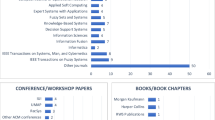Abstract
This paper argues that if we have any information about special interest groups in a society, then one person/one vote is not the most efficient voting system. Instead weighted voting is appropriate where the weights assigned to the various individuals depend on the correlation between different individual utilities. The reason why one person/one vote is inefficient is that the correlation between individual utilities allows us to get some estimates of preference intensities from the individual votes.
After proving this thesis in general, we illustrate it with a three person example. In the example, we find that moderately correlated individuals get the greatest weight.
Similar content being viewed by others
References
Bates, J. M. and C. W. Granger: 1969, ‘The Combination of Forecasts’, J. Oper. Res. Soc. 20, 451–468.
Bordley, Robert F.: 1982a, ‘A Multiplicative Formula for Aggregating Probability Assessments’, Management Science 28 (10), 1137–1148.
Bordley, Robert F.: 1982b, ‘The Combination of Forecasts: A Bayesian Approach’, J. Oper. Res. Soc. 33 (2), 171–174.
Bordley, Robert F.: 1983, ‘A Pragmatic Approach Toward Evaluating Election Schemes through Simulation’, American Political Science Review, March, 123–141.
Bordley, Robert F.: 1985, ‘A Precise Method for Evaluating Election Schemes’, Public Choice 46 (2), 113–124.
Bordley, Robert F.: 1985, ‘Using Factions to Estimate Preference Intensity: Improving Upon One Person/One Vote’, Public Choice, 257–268.
Bunn, D. W.: 1975, ‘A Bayesian Approach to the Combination of Forecasts’, J. Oper. Res. Soc. 24, 325–329.
Dahl, R. A.: 1956, A Preface to Democratic Theory, University Chicago of Chicago Press.
DeGroot, M.: 1974, ‘Reaching a Consensus’, J. Amer. Stat. Assoc. 69.
Downs, A.: 1957, An Economic Theory of Democracy, Harper & Row, New York.
French, S.: 1981, ‘Consensus of Opinion’, Eur. J. of Oper. Res. 7.
Grofman, B., G. Owen and S. Feld: 1983, ‘Thirteen Theorems in Search of the Truth’, Theory and Decision 15, 261–278.
Groves, T. and J. Ledyard: 1977, ‘Optimal Allocation of Public Goods: A Solution to the Free-Rider Problem’, Econometrica 45, 789–803.
Harsanyi, J. C.: 1955, ‘Cardinal Welfare, Individualistic Ethics and Interpersonal Comparisons of Utility’, Journal of Political Economy 63, 309–321.
Madison, James: The Federalist Papers.
May, Kenneth: 1952, ‘A set of Necessary and Sufficient Conditions for Simple Majority Decisions’, Econometrica 20, 680–684.
May, Kenneth: 1953, ‘A Note on the Complete Independence of the Conditions for Simple Majority Decision’, Econometrica 21, 172–173.
Morris, P.: 1974, ‘Decision Analysis: Expert Use’, Management Science 20 (9), 1233–1241.
Morris, P.: 1977, ‘Combining Expert Judgments: A Bayesian Approach’, Management Science 23 (7), 679–683.
Owen, Guillermo: ‘Fair Indirect Voting’, in Proceedings of the 1st NSF Conference on Information Pooling, D. Reidel, Dordrecht (in press).
Wagner, Carl: 1984, ‘Aggregating Sujective Probabilities: Some Limitative Theorems’, Notre Dame Journal of Formal Logic 25 (3).
Winkler, R. L.: 1968, ‘The Consensus of Subjective probability Distributions’, Management Science 15 (2), 1361–1375.
Winkler, R. L.: 1981, ‘Combining Probability Distributions from Dependent Information Sources’, Management Science 27 (4), 479–488.
Author information
Authors and Affiliations
Rights and permissions
About this article
Cite this article
Bordley, R.F. One person/one vote is not efficient given information on factions. Theor Decis 21, 231–250 (1986). https://doi.org/10.1007/BF00134096
Issue Date:
DOI: https://doi.org/10.1007/BF00134096




